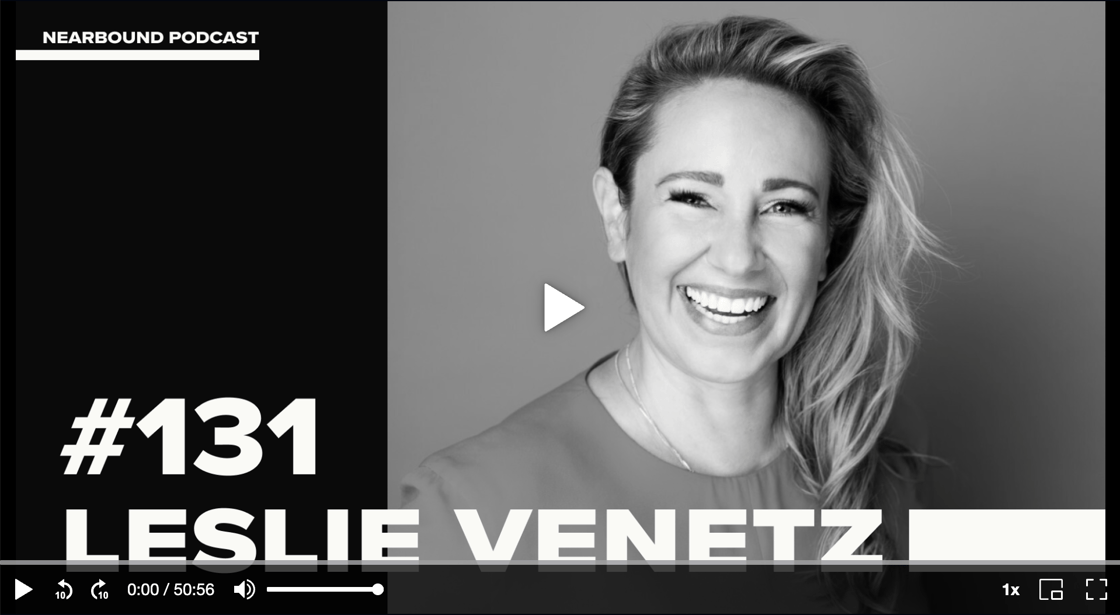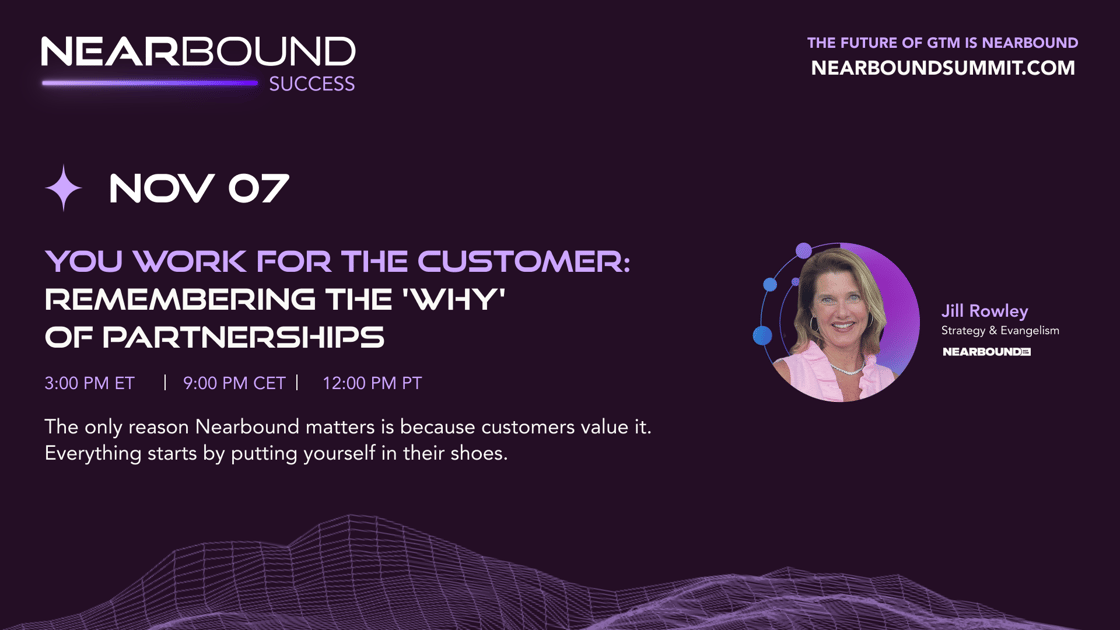Have you seen the full agenda for Success Day at the Nearbound Summit?!
It’s jam-packed with industry giants like Jill Rowley, Jeff Reekers, Jen Spencer, Sunir Shah, and more.
Exaptation vs. Vestigiality

It’s time to turn to nature to help clear the air.
When you hear us say "Inbound and outbound aren’t working anymore", we don’t mean you should kill off these strategies. What we mean is that they need to evolve to include the power of nearbound.
Everyone talks about adaptation in evolution—features that arise and are favored by natural selection for their current function. In some ways, inbound and outbound strategies were, in their time, adaptations of business.
But times have changed. The market has changed. And these strategies have to do the same.
Here are a few other terms from evolution that you should know to understand the vision of nearbound and where it’s taking inbound and outbound.
In evolution, vestigiality is the retention of genetically determined structures or attributes that have lost some or all of the ancestral function in a given species. Basically, these are things that were once really useful, but no longer serve us—like the hindlimb of a snake.
They’re just kinda...there.
Exaptation, on the other hand, often occurs alongside vestigiality. It is when a structure originally used for one purpose is modified for a new one. For example, penguin wings are exaptational in that they serve the (new) purpose of swimming and navigating underwater, but are still regarded as vestigial in that they’ve lost the function of flight.
Inbound and outbound aren’t vestigial structures—at least not yet. They are still very powerful tools that we should take advantage of.
But they are losing the power they once had.
What we propose is transforming inbound and outbound into exaptations, refocusing their purpose to support a nearbound strategy.
Because when we surround our GTM strategy with the intel, influence, and introductions of our buyer’s trusted nodes, there’s no stopping us.
The power of outbound + nearbound

Before you implement a
nearbound strategy, you need to diagnose what’s going wrong with outbound. Leslie Venetz, Founder of Sales Team Builder, joined the
Nearbound Podcast to talk about the ways in which the best outbound layers onto nearbound. They discussed:
-
Finding strategic ways to connect with customers through those around them
-
Understanding your ICP by understanding who influences them
-
Real personalization vs fake personalization

The Google game
Are we getting played by Google?
The short answer is yes. The politically correct answer is that it’s still under investigation.
The Hustle reports that former DuckDuckGo executive, Megan Gray, attended Google’s ongoing antitrust case. Gray shared an opinion piece for Wired that explained that Google was facing scrutiny for “semantic matching” to generate more shopping-oriented results.
Semantics matching is when Google provides search results for synonyms or related terms, such as providing results for “cat” if you search “feline”.
But Gray explains that Google is taking it a step further than search enrichment:
-
You search for “running.”
-
Google changes it to “Nike running shoes.”
-
Now that your search is more related to shopping.
And guess who collects every time you click on an ad? That’s right, Google. This results in worse search results for users, and higher revenue for Google.
This is a pretty scary reality if you really think about it. Google holds 90%+ of the search engine market share and comes as the default search on Apple products.
And though Google maintains that its search results are objective, The Hustle explains that a 2019 Wall Street Journal investigation found that Google:
-
“Made algorithmic changes that favor big advertisers like eBay and major websites like Amazon and Facebook.
-
Adjusted autocomplete suggestions, “featured snippets,” and other info — sometimes to hide controversial topics.
-
Blacklisted certain sites (and not just those required by law).”
If the very tool we rely on to get and share information—and (attempt to) attract customers—is not trustworthy, then how can we build trust with our buyers?
We have to lean on and leverage the trust and connections that already exist in our ecosystems.
Become a SURV-AI-VOR
In partnership with Mutiny
📈 Become a 10x marketer with these AI workflows (and win $10K)

Stop wasting your time with AI prompts and workflows that don’t actually make you a better marketer.
Our friends at Mutiny assembled a killer group of marketing practitioners who will share real AI workflows to help you 10x your ability.
Here’s how it works:
-
The Virtual Premiere: On October 24th, hear from GTM leadership from OpenAI, Writer, Autodesk and Cowboy Ventures discussing their vision for the future of AI in marketing.
-
The Game Begins (October 24th – November 14th): Then tune into episodes from experts at Hubspot, Pendo, MKT1, and many more! Learn groundbreaking AI workflows from practitioners in all fields of marketing. Earn points by completing quick and tangible challenges to increase your chance of winning the $10K grand prize. Every registrant adds a dollar to the pot!
Use our referral code NEARBOUND for 200 bonus points just for signing up.
Stuff you don’t want to miss!
-
Join the official Nearbound Summit community brought to you by Partnership Leaders —
Partnership leaders’ goal is to connect people interested in learning about partnerships around the world. -
October 18th —Firneo Partner Strategy Forum (Day 1):
How to Fix Your Broken Partner Program—
Learn how to fix the root cause of your partner program’s biggest challenges. -
October 25th —Firneo Partner Strategy Forum (Day 2):
How to Prioritize the RIGHT Partners—
Learn how to make sure you’re investing your (limited) resources in partners that will generate a meaningful. -
November 1st —Firneo Partner Strategy Forum (Day 3): How to Get Executive Buy-In for Partnerships—
Learn how to secure resources & support from key stakeholders that are critical to partnership success. -
November 6th-9th —Nearbound Summit 2023—
The future of GTM is Nearbound. Join us for the biggest-ever remote experience in GTM where B2B leaders across departments unite to share how they’re winning with Nearbound strategies and tactics. -
April 19th-20th –SaaS Connect 2023–
It’s that time of year again! Get your spot early for the 11th annual partnership conference in San Francisco, hosted by Cloud Software Association.
Join Jill at the Nearbound Summit
Don’t miss Jill Rowley on Nov. 7th at Success Day of the Nearbound Summit. Her session, You Work for the Customer: Remembering the ’Why’ of Partnerships, will deep dive into customer-centric nearbound strategies.




